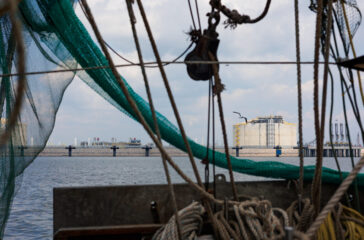Booming natural gas exports threatening Gulf Coast fishing communities
By Shannon Kelleher
Most mornings, Nathan Berwick rises well before dawn at his home in Calcasieu Parish, Louisiana, setting out on nearby Lake Charles in a small fishing boat to check his crab traps. If it’s not too hot and the water is calm, Berwick’s family occasionally joins him on the boat. His eleven-year-old daughter enjoys playing with baby crabs that fall from the traps as Berwick hauls them from the water.
 EWG
EWG